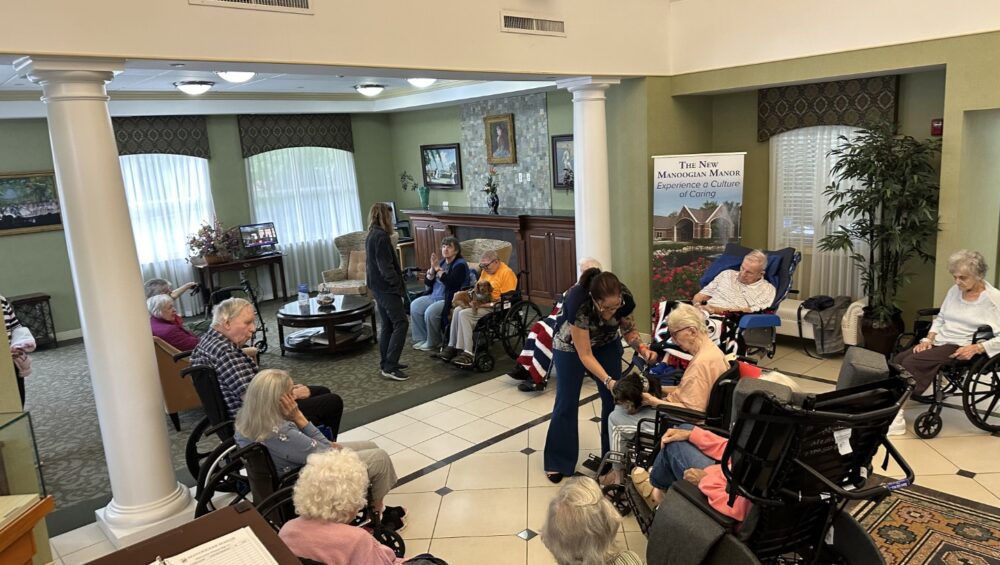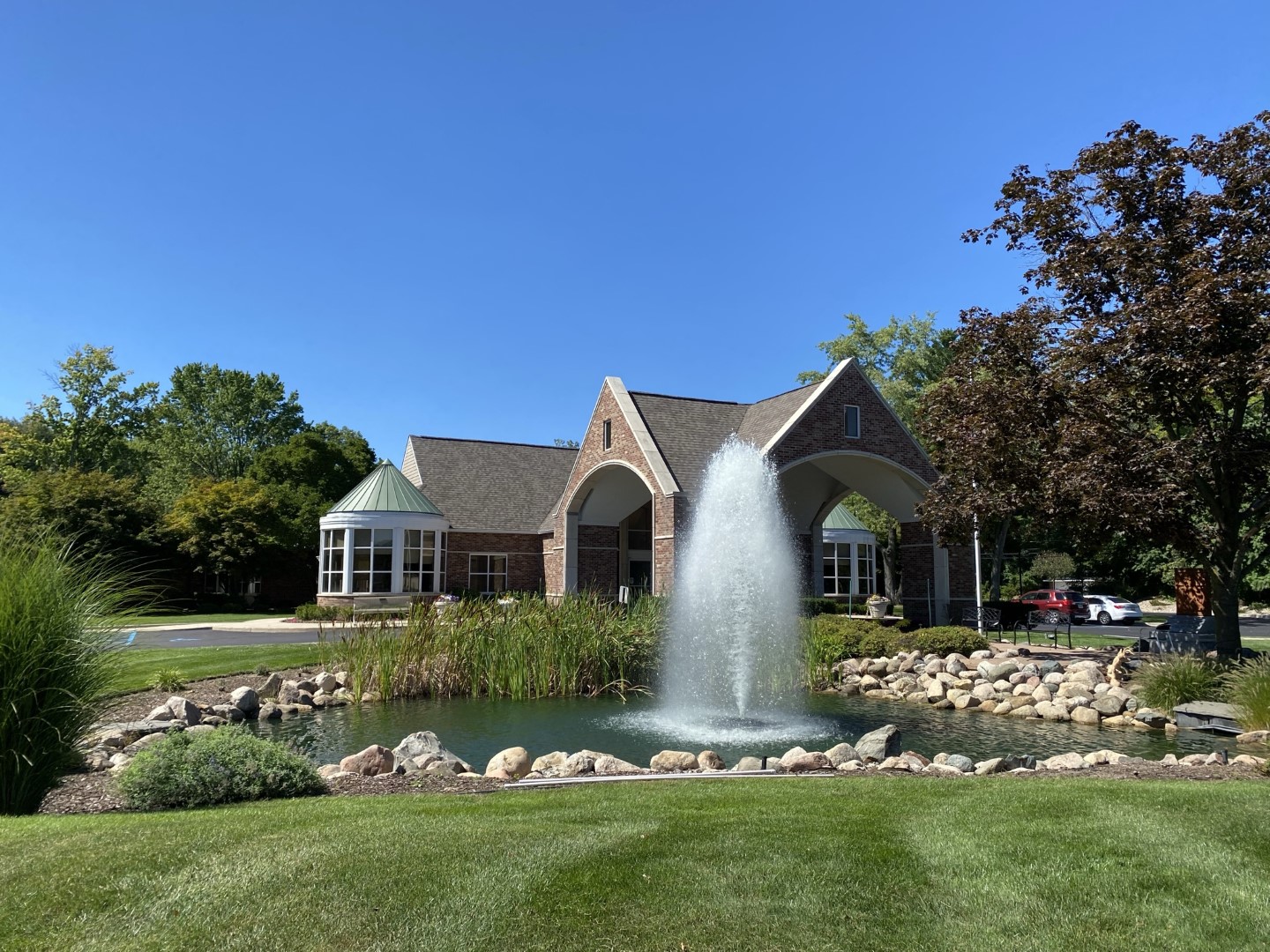As people age, they often face a range of challenges that can affect their mental and emotional well-being. Feelings of loneliness, anxiety, and depression can become more prevalent, especially when seniors transition to assisted living. Finding ways to enhance their quality of life and emotional health becomes a priority for caregivers and family members. One increasingly popular and effective approach to improving the well-being of seniors is pet therapy. Pet therapy involves the interaction between seniors and specially trained animals, providing comfort, companionship, and a host of emotional benefits. At Manoogian Manor, we recognize the profound impact that animals can have on our residents, and we incorporate pet therapy into our care approach. In this article, we’ll explore the many benefits of pet therapy for seniors in assisted living and how these interactions can significantly enhance their mental and emotional health.
The Positive Impact of Pet Therapy on Seniors
-
-
Reducing Feelings of Loneliness and Isolation
-
One of the most significant benefits of pet therapy is its ability to reduce feelings of loneliness and isolation among seniors. Many elderly individuals experience loneliness due to the loss of a spouse, family members living far away, or the transition to an assisted living community. Interacting with therapy animals provides a source of companionship and unconditional love, helping seniors feel more connected and less isolated. For instance, spending time with a friendly dog or cat can create a sense of comfort and familiarity, making seniors feel less alone in their new environment. At Manoogian Manor, pet therapy sessions are a regular part of our programming, allowing residents to enjoy the companionship of animals and alleviate feelings of loneliness.
-
-
Enhancing Mood and Emotional Well-Being
-
Pet therapy has been shown to have a positive impact on mood and emotional well-being. The presence of animals can trigger the release of endorphins, the body’s natural “feel-good” hormones, which help reduce stress and promote a sense of happiness. For example, petting a dog or holding a small animal like a rabbit can bring immediate joy and relaxation to seniors, lifting their spirits and reducing symptoms of depression and anxiety. At Manoogian Manor, we’ve observed how regular interactions with therapy animals can brighten the day for our residents, providing them with moments of joy and emotional relief.
-
-
Providing a Sense of Purpose
-
Caring for or interacting with a therapy animal can give seniors a renewed sense of purpose. Many older adults who have spent their lives caring for others may feel a void when they no longer have these responsibilities. Pet therapy allows them to experience the joys of caring for an animal, even if it’s for a short period. This interaction can give them a sense of responsibility and fulfillment, knowing that they are contributing to the well-being of the animal. For example, residents at Manoogian Manor may participate in feeding or grooming therapy animals during sessions, providing them with a meaningful and rewarding experience.
-
-
Promoting Social Interaction
-
Pet therapy also serves as a catalyst for social interaction among seniors. The presence of an animal often encourages conversation and bonding between residents, creating opportunities for them to connect with one another. For instance, during a pet therapy session, residents may share stories about their own pets or discuss their favorite breeds, leading to new friendships and social connections. These interactions help build a sense of community within the assisted living environment, reducing social isolation and fostering a more supportive and engaged atmosphere.
-
-
Reducing Anxiety and Agitation
-
Seniors with cognitive impairments, such as dementia or Alzheimer’s disease, often experience anxiety and agitation. Pet therapy has been shown to have a calming effect on these individuals, helping to reduce stress and improve their overall demeanor. The simple act of petting an animal can be soothing and help divert attention away from sources of anxiety. At Manoogian Manor, we incorporate pet therapy into our memory care programs, recognizing its ability to provide comfort and reduce agitation in residents with cognitive challenges. This therapeutic approach helps create a more peaceful environment, enhancing the quality of life for our residents.
-
-
Encouraging Physical Activity
-
Interacting with animals can also encourage seniors to be more physically active. For example, walking a dog or playing with a cat can involve gentle movement and exercise, which is beneficial for maintaining mobility and overall health. Even small actions like throwing a ball for a dog or brushing a pet can help seniors stay active and engaged. At Manoogian Manor, pet therapy sessions are designed to be interactive, allowing residents to participate in activities that promote physical movement and engagement with the animals. These activities contribute to their physical health while providing a fun and enjoyable experience.
-
-
Stimulating Memory and Cognitive Function
-
For seniors with memory-related conditions, pet therapy can be a valuable tool for stimulating memory and cognitive function. Interacting with animals can evoke memories of past pets or experiences, helping to improve recall and cognitive engagement. Additionally, the routine of regular pet therapy sessions provides structure and familiarity, which can be comforting for individuals with cognitive impairments. At Manoogian Manor, we’ve seen how therapy animals can help spark memories and encourage cognitive activity in our residents, offering them a sense of connection to their past and enhancing their mental stimulation.
Pet therapy offers a unique and powerful way to improve the mental and emotional well-being of seniors in assisted living. Through interactions with therapy animals, seniors experience reduced feelings of loneliness, enhanced mood, a renewed sense of purpose, and increased social interaction. Additionally, pet therapy helps alleviate anxiety, encourages physical activity, and stimulates memory and cognitive function. At Manoogian Manor, we have witnessed firsthand the transformative effects of pet therapy on our residents, and we are proud to incorporate this therapeutic approach into our care programs. By embracing the benefits of pet therapy, we continue to create a nurturing and supportive environment where our residents can thrive, surrounded by the love and companionship of our furry friends.





